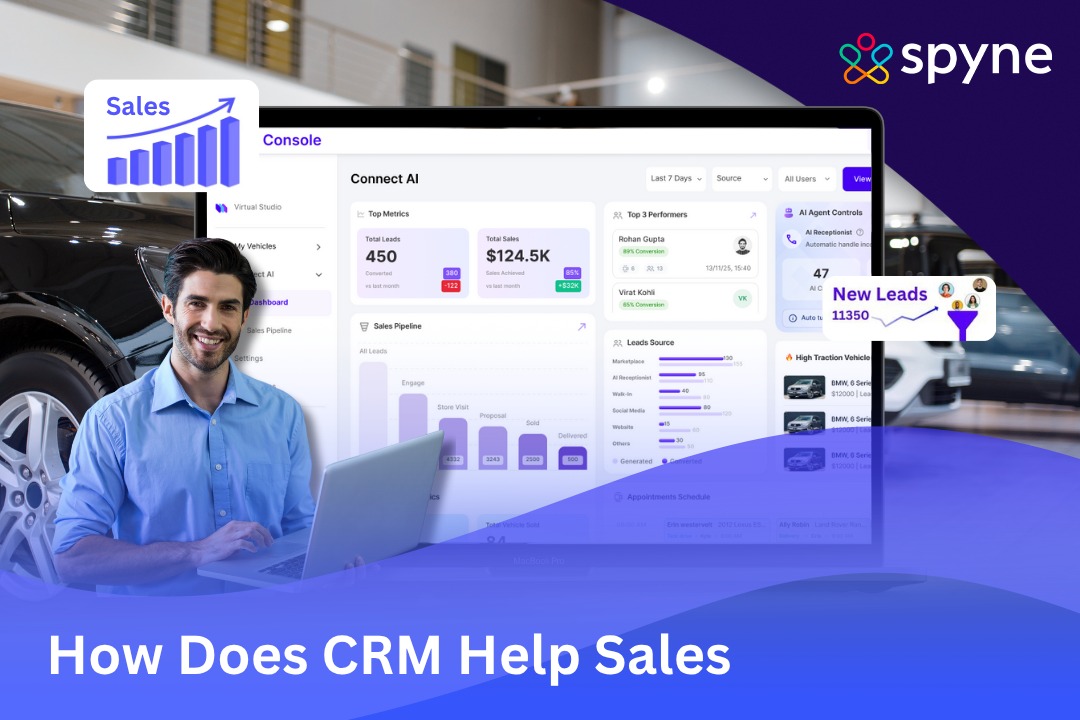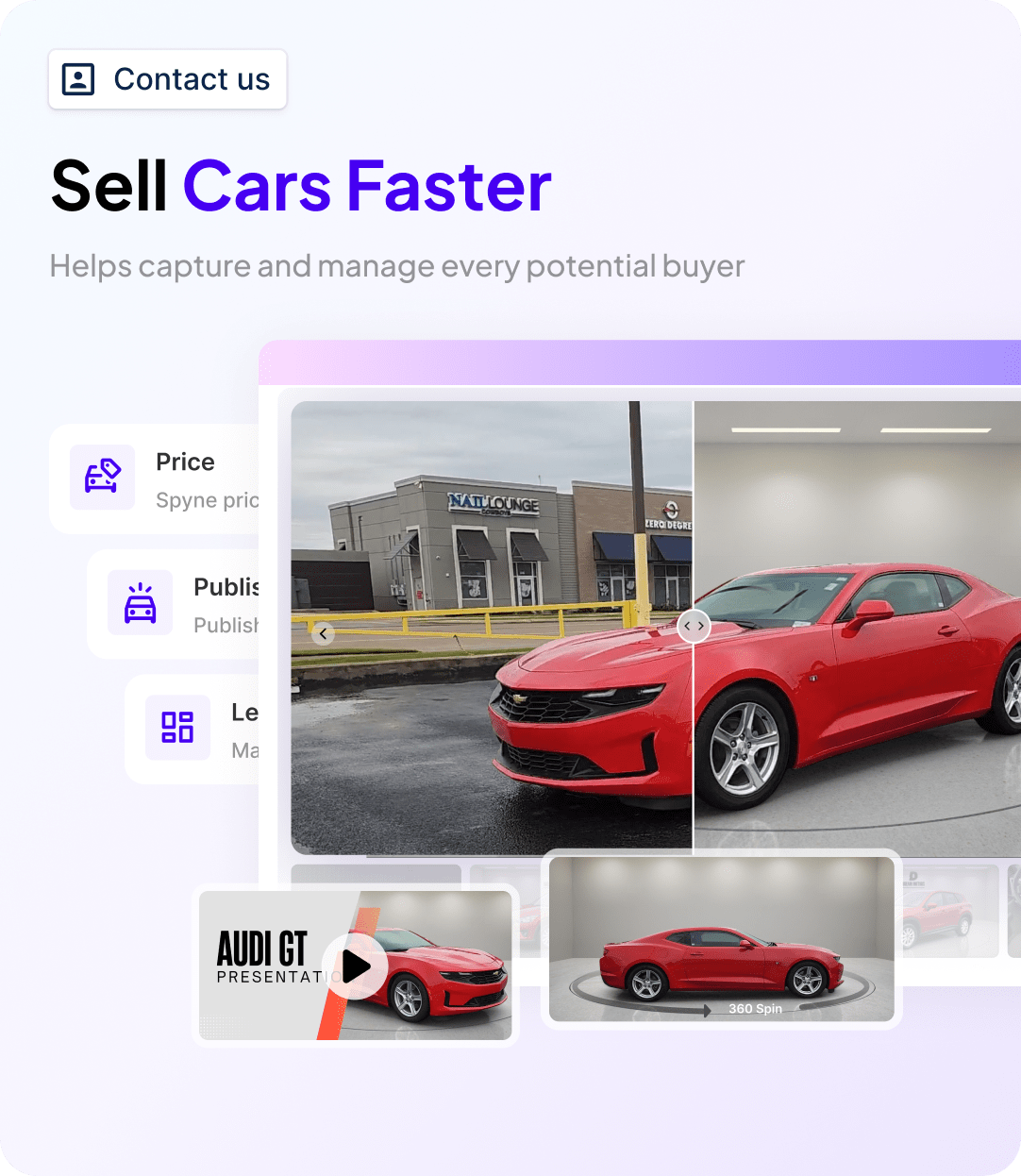In today’s fast-paced automotive market, managing leads and customer interactions efficiently is crucial for closing more deals. Understanding how does CRM help sales is key to organizing sales activities, automating follow-ups, and delivering personalized experiences. If your team struggles with missed callbacks or slow sales cycles, learning how does CRM help sales can unlock new growth opportunities. In this blog, we’ll explore 15 proven ways a robust dealership CRM can transform your sales process and drive lasting success.
What is a Sales CRM?
A Sales CRM is a simple tool that helps car dealerships manage their sales activities, leads, and customer conversations in one place. It keeps track of every call, message, and follow-up so that no lead is missed. When you wonder how does CRM help sales, the answer lies in how it replaces juggling spreadsheets or sticky notes with an organized system that shows who to call, when to follow up, and what the customer wants.
A sales CRM system also automates boring tasks like reminders and data entry, so your team can focus more on building customer relationships. With good CRM software for sales, dealerships can close more deals, work faster, and offer a better experience to buyers. Even if you’re not tech-savvy, a sales CRM tool is easy to use and helps your team sell smarter every day.
How Does CRM Help Sales: 15 Proven Ways with Examples
If your sales team is buried in spreadsheets, missing follow-ups, or struggling to close leads, it’s time to understand how does CRM help sales. A robust CRM for sales car dealerships does more than store contact data. It streamlines workflows, prioritizes hot leads, automates follow-ups, and provides the insights your team needs to close more deals, faster.
Let’s break down the top 15 ways a sales CRM helps accelerate sales with real-life examples and actionable tips to boost ROI.
1. Centralizes All Leads in One Dashboard
CRM for sales car dealerships works by collecting leads from websites, marketplaces, and social platforms, then displaying them in one unified dashboard. No more juggling Excel files or digging through inboxes.
Example: A used car dealership captured leads from Google Ads, Facebook, and AutoTrader, all funnelled into one sales CRM system, cutting lead leakage by 45%.
Pro Tip: Using Spyne’s CRM software for sales, you can auto-sync leads from multiple channels into one place without any manual work. This is a prime example of how does CRM help sales by eliminating data silos and lead losses.
2. Automates Sales Follow-Ups to Keep Leads Warm
Time kills deals. Sales CRM tools ensure timely follow-up emails, call reminders, and task assignments based on lead behavior or sales stage.
Example: A rep forgot to follow up with a warm lead, but an automated CRM in sales reminder sent an email that reactivated the conversation and closed the deal.
3. Tracks the Entire Customer Journey Across Channels
Modern customer relationship management in the automotive industry tracks every touchpoint, including calls, chats, emails, and form fills, giving your reps full visibility into each lead.
Example: One dealership noticed that leads who used the finance calculator twice were 3x more likely to convert. With CRM software for sales, reps are engaged at the perfect moment.
Pro Tip: Spyne’s sales CRM tool uses AI to identify high-intent signals based on journey behavior.
4. Prioritizes High-Intent Leads with Smart Lead Scoring
CRMs prioritize high-intent leads using automotive lead scoring, helping dealerships focus on engaged prospects, boost sales efficiency, and improve sales management CRM strategies by targeting the most promising buyers.
Example: A rep closed four cars in a week by only working leads with scores above 80. This shows how does CRM help sales teams work smarter, not harder, by focusing efforts where they matter most.
5. Enables Personalized Conversations with Segmented Targeting
The CRM for multiple dealership locations lets dealerships segment leads by car type, budget, or location to send tailored messages that resonate better. Personalized outreach drives higher engagement and builds stronger customer relationships.
Example: A sales rep targeted families with SUV offers and achieved a 32% higher reply rate compared to generic emails. Adding personalized CRM sales and marketing increases conversions and improves the overall customer experience.
Pro Tip: Spyne’s AI links sales CRM tool data with real-time inventory to auto-suggest personalized offers.
6. Shortens Sales Cycles by Automating Deal Stages
CRM for sales car dealerships speeds up sales by automatically moving deals through dealership sales pipeline management, sending timely reminders, and scheduling calls or test drives without manual intervention.
Example: One dealership cut its average sales cycle from 15 days to just 8 days by implementing automated sales CRM workflows.
7. Keeps Your Sales Team Aligned with Shared Visibility
A sales management CRM ensures everyone on the team accesses the same lead notes, updates, and activity history in real time, preventing miscommunication and duplicated efforts.
Example: When a sales manager noticed a deal was stalling, they quickly reassigned another rep to follow up, saving the sale and boosting team collaboration.
8. Boosts Sales Forecasting Accuracy Using Deal Pipeline Data
By analyzing funnel stages and close rates, a CRM for sales platform helps you accurately forecast monthly revenue and plan resources effectively.
Example: A manager used sales CRM system metrics to predict quarterly revenue with 90% accuracy, enabling strategic decisions.
Pro Tip: Spyne’s dashboard visualizes real-time forecasts using CRM in sales data.
9. Automates Data Entry to Eliminate Manual Errors
CRM sales software captures lead details automatically from chats, forms, and calls, eliminating typos or duplicate entries.
Example: One dealership boosted efficiency by saving five hours per rep per week via automated sales CRM tool data capture.
10. Boosts Engagement with 24/7 CRM-Connected Chatbots
CRM software for sales enables 24/7 customer support through integrated chatbots that answer queries, collect info, and schedule appointments even after hours.
Example: A dealer generated 200 leads in one month using auto sales CRM tools, with most inquiries between 7 PM and 11 PM.
Pro Tip: Spyne’s AI Concierge keeps leads engaged even when the team is offline using CRM in sales chat integration.
11. Helps Track Sales Team Performance and Activities
Sales management CRM platforms give managers real-time visibility into rep activity, encouraging accountability and improved performance.
Example: A rep boosted performance after reviewing CRM sales activity reports to match top sellers.
12. Increases Cross-Selling and Upselling Opportunities
Sales CRM tools analyze customer behavior to suggest relevant add-ons, increasing revenue per sale.
Example: A rep sold extended warranties to three out of five buyers thanks to automated upsell prompts in the CRM software for sales platform.
13. Supports Omnichannel Sales Conversations with One Timeline
What is a sales CRM without unified communication? CRM responsibility in automotive industry combines chats, emails, and calls into one thread for smoother interactions.
Example: A lead who first chatted via WhatsApp and later emailed was seamlessly followed up on, thanks to CRM in sales.
Pro Tip: Spyne’s sales CRM tool merges all channels into a single timeline. This also highlights how does CRM help sales by creating a seamless customer experience that leads to more conversions.
14. Enhances Customer Retention Through Smart Reminders
Wondering what is CRM in sales good for after the sale? CRMs automate post-sale reminders to build loyalty.
Example: A dealership increased service appointments by 20% using birthday and oil change reminders through its car dealership CRM system.
15. Helps Scale Your Sales Team and Standardize Onboarding
A solid CRM for sales helps onboard new reps faster by providing access to histories and templates instantly.
Example: A 3-location dealership used a sales CRM tool to onboard five reps in a month with no drop in performance.
Pro Tip: If you’re still asking what is a sales CRM, it’s the foundation that scales your entire sales organization without chaos.
How Spyne CRM Helps Drive Dealership Sales Growth
Spyne’s automotive CRM equips used car dealerships with powerful tools designed to simplify lead management, automate marketing efforts, and provide 24/7 customer engagement, all to boost conversions and improve the overall buying experience. For those wondering how does CRM help sales, Spyne provides the answer by leveraging AI-powered automation to streamline dealership operations and drive measurable sales growth.
1. Effortless Lead Capture and Smart Syncing
Spyne’s AI-driven CRM, Connect.ai, automatically captures leads from your website, social media channels, and marketplaces. This seamless syncing organizes every lead into your sales pipeline without manual input, ensuring no customer inquiry slips through the cracks. This smart lead management shows how CRM helps sales by streamlining the process from first contact to conversion.
2. Reactivate Cold Leads Through Targeted Marketing
Spyne’s CRM for auto dealerships uses stored customer data to launch live, outbound campaigns that re-engage cold leads. With the help of the automotive CRM feature, expand your active prospect base by reconnecting with customers who may be ready to buy again.
3. Monitor Performance with Real-Time Reports
Spyne’s car dealer CRM system provides intuitive dashboards that track lead flow, employee productivity, and campaign effectiveness. Real-time performance graphs enable managers to spot trends and adjust sales strategies quickly, continually improving customer interactions and dealership results. These insights demonstrate how does CRM help sales teams make informed decisions and close deals faster.
4. 24/7 Virtual Receptionist for Seamless Customer Engagement
Spyne’s AI-powered automotive chatbots and virtual receptionist act as your dealership’s round-the-clock front line. They answer inquiries about inventory, budgets, and financing options, ensuring no potential lead goes unanswered, even outside office hours. This continuous engagement elevates customer satisfaction and increases lead conversion opportunities.
5. Automated Multi-Channel Marketing Touchpoints
Spyne automates personalized follow-ups and promotions across email, SMS, and social media channels. This multi-channel approach keeps your dealership top of mind and continuously drives targeted traffic back to your showroom or website. Spyne’s seamless CRM integration ensures consistent communication and boosts lead conversions for car dealerships.
6. Streamline Operations with Smart Task Management
Spyne’s automotive retail solution and task management software help car dealerships stay organized by handling everything from lead follow-ups to service job scheduling. It keeps your team in sync, avoids delays, and ensures every task is completed on time. This means smoother operations, faster responses, and a better experience for your customers.
Conclusion
A powerful sales CRM helps sales by managing leads, boosting engagement, and driving faster growth for dealerships. With automated follow-ups, real-time insights, and AI-powered tools, your team can close more deals faster and deliver a superior buying experience. Don’t miss out on potential sales. Discover how Spyne’s CRM can transform your dealership today. Book a free demo now and start selling smarter!
















